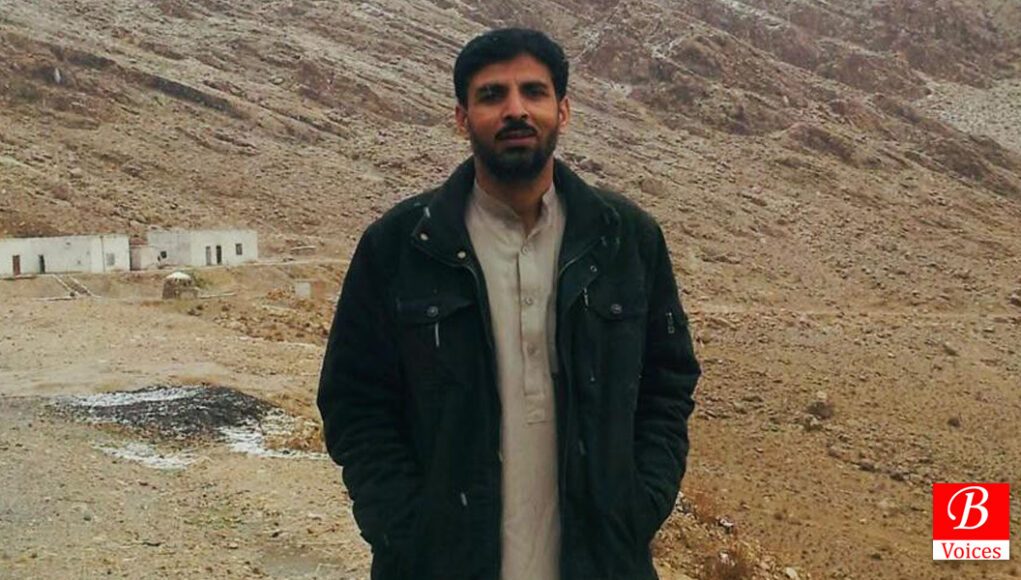Najeebullah Sarparah
Translated from Urdu: Saddam Tariq Sumalani
I have a memory from childhood: an elderly man in a mud house is weighing some herbs , a woman is helping him, and a young man is standing by, listening with a book in his hand. My mother told me, “This young man is Khair Jan,” and those were his parents. His father was a herbalist. Khair Mohammad Sumalani was my grandmother’s nephew, so I called him uncle instead of cousin, and he always called me nephew.
Whenever I met Khair Jan, he asked about my studies. He inquired about my future plans and offered guidance. He asked a lot of questions. I would ask my mother, uncles, and their relatives how Khair Jan managed to study in such a place. My mother said, “Hard work.” She would then recount incidents from the times when Khair Jan was studying in our village, Kirdgap. He often had no slippers for his feet, sometimes no food to eat, and sometimes the doors of the house were closed on him. Despite these challenging conditions, he never mentioned it to anyone, and this habit persisted until the end. He would not say anything at home. He would endure everything but never express any sorrow or pain. How much would a herbalist earn? But Khair Jan did not make this his weakness. He charted a path, the path of hard work.
Sangat Khair Jan experienced every suffering in life. He was a sensitive person who could not see anyone in pain. He encouraged educated young people. He secured jobs for dozens of young men. He guided them. He financially assisted hundreds but never mentioned it. Whoever he found unemployed, he brought to his home, gave them clothes, a suit and tie, and by the next morning, a job.
As the sole breadwinner of the family, he held multiple jobs simultaneously to keep the household running and meet all needs. This hardworking individual started his career as a computer operator in a hotel, worked as a tailor, did labor work, taught in an academy, became a medical representative for a pharma company, got promoted to manager, worked as an SST (Secondary School Teacher), was appointed an English lecturer, resigned from the pharma company as a manager, opened a medical store, worked and ran the household while continuing his studies. He completed an MPhil in English Literature.
He was a man who read and wrote. He wrote various articles. Some were published; others remained. He wanted to compile them into a book. Hopefully, his dream will come true one day. He had a great passion for studies. He never wasted a moment. There was always a book in his car. I remember one night when I was entering the emergency department of BMC Hospital to visit a patient, I saw a car that looked familiar. I went closer and saw my uncle reading an English novel. When he couldn’t find a book in Quetta, he would ask me to get it from Lahore. Recently, he asked for an English literature book. When I went to deliver the book to the medical store, the same book was already there. He said, “A friend just sent it today.” I said, “Keep this one too.” He smiled.
Whenever Sangat Academy gathered, whether it was a literary event, a seminar, Khair Jan was there. He spoke on various topics and listened. His social circle was very wide. Khair Jan never wasted any time. He learned whenever he could and guided others. If he finished an event at one place, he would reach another.
The forum, study circle, and literary gatherings he was looking for were found in the form of the “Sangat Academy of Sciences.” He never missed a session. Whether it was the “Sunday Party” or “Sangat Poh Zant,” he was present at every meeting. For the past decade, he was an active member of the Sangat Academy. He was also a member of the Sangat Academy’s Education Faculty. Whoever met him, young or old, he would bring them to Sangat. His untimely death is an irreparable loss, especially for Sangat Academy.
He had strong nerves. He had suffered two heart attacks, which led to heart bypass surgery. Very few people knew this because he never mentioned it to anyone. His family was unaware of his bypass surgery, and he went alone to Karachi to get the operation done at his friend’s place. The biggest shock for Sangat Khair Jan came when his laptop, mobile, and a USB were stolen from his car. All his records were lost.
He lived a very simple life. He would buy old shoes at low prices and wear them. He would use a pair of clothes for months. A new mat was never seen in the house. But he paid great attention to his attire at formal meetings and advised everyone to follow the dress code. He personally took part in the construction of his mud house. Whatever he earned, he spent on education and helping others. He would say, “It is better to spend money on children’s education than on the adornment of the house.” He wanted to do a lot. He was in a position to build a house and give something to society, but life did not give him a chance.
Whenever he left the house, he would bid his parents, especially his mother, farewell and greet them when he returned. He had three daughters and one son. He loved them very much. He fulfilled all their needs. He wanted to see them all succeed. If anyone in this family educated girls, it was Khair Jan. I asked his younger brother, “Who was Khair Jan?” He replied, “He was our father.”
Late-night and early morning phone calls often bring bad news. On Friday, March 15, 2019, I received such a call. On the other side was my uncle. He said, “Khair Jan has passed away.” I composed myself and asked twice, “Which Khair Jan…?” I prayed that what I was hearing was not true, but destiny had other plans. After the funeral prayer, some students came to me in the cemetery. They had backpacks on their shoulders. They asked, “Is this the same teacher Khair Jan?” I nodded in affirmation. They went and sat by his grave.
I last saw him on Masjid Road. He was in his car, and I was in mine, so we couldn’t talk. That face is still etched in my memory. Khair Jan, who opened his eyes on May 5, 1977, left this world forever on March 15, 2019. Sangat Khair Jan, who saw merely forty-two springs of life, was truly a remarkable human being. He was a self-made man. A person who lived for others. A great human being. Such people are rare to find. I wish we learn to value them during their lifetime.
Disclaimer: Views expressed in this article are those of the writer and Balochistan Voices does not necessarily agree with them.
Share your comments!








